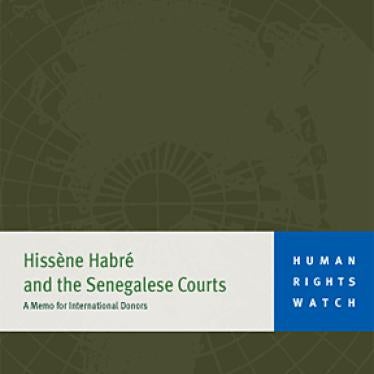(Brussels)- Now that Senegal has placed the case of Hissène Habré in the hands of the African Union, African leaders should recommend the extradition of the former Chadian dictator to Belgium, where he is wanted to stand trial for crimes against humanity, Human Rights Watch said today in a study of the various options for bringing Habré to justice.
The creation of a new African tribunal would be too distant, too contingent, and too costly, Human Rights Watch said. The study also ruled out Habré’s return to Chad because of the risks to Habré’s own security and the difficulties of ensuring that he would receive a fair trial. Senegal, where Habré was indicted in 2000, has already said that it will not try the case.
On November 27, Senegalese Foreign Minister Cheikh Tidiane Gadio said that it was “up to the African Union summit to indicate the jurisdiction which is competent to hear the case.” The summit is scheduled to be held in Khartoum on January 23-24.
“Extraditing Habré to Belgium is the most realistic option for ensuring a prompt and fair trial,” said Reed Brody of Human Rights Watch, who coordinates the international campaign for the Chadian victims. “Creating an ad hoc African tribunal to try Habré would entail enormous political will, years of delay, and costs of at least $100 million.”
On September 19, a Belgian judge issued an international arrest warrant charging Habré with crimes against humanity, war crimes, torture, and serious violations of international humanitarian law. After Habré’s arrest in Senegal on November 15, a Senegalese court on November 25 said that it had no jurisdiction to rule on the extradition request, throwing the case into a legal limbo. Senegal then asked the African Union to decide jurisdiction over the case.
Human Rights Watch noted that Habré’s victims have been waiting for fifteen years to find a court to hear their case, and that it has been almost six years since they filed the first suit in Senegal. Many of the victims have died since then, including one of the plaintiffs in the Senegal case, and one of the lead plaintiffs in Belgium, both of whom died as a result of their mistreatment under Habré.
“This case must not become a political football,” said Brody. “Habré’s victims have suffered too much and waited too long to find a court willing to listen to them. Belgium is ready and able to hear the case.”
Human Rights Watch noted that the Chadian government has consistently supported Habré’s extradition to Belgium. In 2002, the Chadian justice minister wrote to the Belgian investigating judge to state that “Mr. Hissène Habré can not claim to enjoy any form of immunity from the Chadian authorities.” The Libyan foreign minister, Mohamed Tahar Siala, said last week that the African Union should respect the Chadian government’s wishes and recommend extradition to Belgium.
Human Rights Watch said if an African country sought Hissène Habré’s extradition, this might also be a viable option. The country would need to have an independent judiciary with jurisdiction over the crimes, adhere to international fair trial standards, not impose the death penalty and, preferably, be a Francophone country. In order not to delay the trial for years, however, an arrangement would need to be devised to permit the courts of that country to adopt the results of the four-year Belgian investigation and admit them into evidence.
Background
Hissène Habré ruled the former French colony of Chad from 1982 until 1990, when he was deposed by current President Idriss Déby and fled to Senegal. His one-party regime was marked by widespread atrocities. Habré periodically targeted various ethnic groups such as the Sara (1983-84), Chadian Arabs, Hadjerai (1987), and the Zaghawa (1989-90), killing and arresting group members en masse when he believed that their leaders posed a threat to his regime. Files of Hissène Habré’s political police, the DDS (Direction de la Documentation et de la Sécurité), discovered by Human Rights Watch in 2001, reveal the names of 1,208 persons who died in detention. A total of 12,321 victims of different abuses were mentioned. In these files alone, Hissène Habré received 1,265 direct communications from the DDS about the status of 898 detainees.
In February 2000, a Senegalese court charged Habré with torture and crimes against humanity and placed him under house arrest. But in March 2001, Senegal’s highest court said that Habré could not stand trial in Senegal for crimes allegedly committed elsewhere. Habré’s victims immediately announced that they would seek Habré’s extradition to Belgium, where twenty-one of Habré’s victims had filed suit. A four-year investigation by a Belgian judge resulted in an international arrest warrant against Habré on September 19, 2005 and his arrest in Senegal on November 15. On November 25, a Senegalese court said that it had no jurisdiction to rule on the extradition request.






